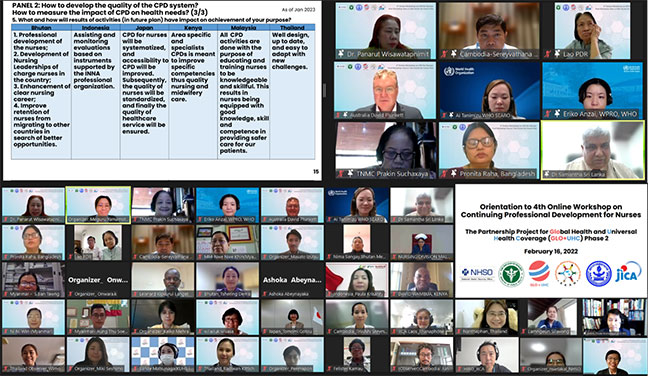- Home
- Technical Cooperation Projects
- Index of Countries
- Asia
- Thailand
- The Partnership Project for Global Health and Universal Health Coverage Phase 2
- Project News
- The 4th Workshop of Online Workshop Series on Continuing Professional Development for Nurses: How to Take Action for Future Plan
Project News
2023-02-16
The 4th Workshop of Online Workshop Series on Continuing Professional Development for Nurses: How to Take Action for Future Plan
The 4th workshop of the Online Workshop Series on Continuing Professional Development (CPD) for Nurses was held on 16 February 2023. Around 40 participants and 30 observers from 12 countries joined. The 4th workshop was also the final workshop of the series having two panel discussions that aimed to find the way forward for all the participating countries. Four experts from the Australian College of Nursing, Thailand Nursing and Midwifery Council, WHO Regional Office for South-East Asia and Regional Office for the Western Pacific joined the panels as well as the representatives from the participating countries.
The theme of the first panel was “how to regulate the CPD system in response to the health needs of the country” and countries where the CPD system is currently being developed or has just begun joined the panel discussion. Panellists confirmed the importance of legislation for CPD and legally ensuring the provision of CPD opportunities for nurses. Most of the countries joining the workshop have mandated or considering mandating CPD for nurses and linking it with license renewal with the aim to enhance the quality of nursing. One of the experts pointed out that when considering the linking, CPD programs need to be available and accessible for all nurses so that all nurses who wish to keep their licenses can obtain the required number of CPD credits in a certain time. It was also mentioned that there should be an alternative way to renew their license such as conducting exams, in case they could not reach the required number of CPD credits. There was also a discussion of having a consistent system for all nurses in the country. It is not easy for nurses working in rural areas in some countries to access CPD opportunities, thus having mandatory CPD for all may not be feasible. However, an expert mentioned that CPD should not be limited to classroom learning, in-service training, attending conferences, etc., but should have alternative ways by using any innovative methods, such as IT technology, that allow even the nurses working in very remote areas to access to various CPD opportunities.
The theme of the second panel discussion was “how to develop the quality of the CPD system and attempted to discuss how to measure the impact of CPD on health needs” and countries where the CPD system has already been developed and seeking a way to improve it joined the second panel.
The panellists shared their experience on having guidelines and financial subsidies to ensure the quality of CPD trainings. They also talked about standardizing the system throughout the country and collaborating with the private sector to provide equal opportunities for all nurses. A panellist presented the government’s monitoring system for CPD crediting system managed by private healthcare institutions. Experts emphasized the importance of having evidence-based CPD programs which require standards for the components including trainers. To set the standards, there is a need for the establishment of a committee that can monitor the programs and give reliable feedback.
When talking about the impact of CPD, we need to focus on healthcare outcomes and inputs to the healthcare system. However, it is well known that no single indicator could measure the impact of CPD, and it is difficult to distinguish the impact of other factors from the impact of CPD when we focus on healthcare outcomes. The experts suggested using measurable indicators such as nurses’ satisfaction, perception of their changes in attitudes, knowledge, skills and/or confidence levels.
Despite having tough questions as the topics of the panel discussions, the panellists shared experiences, opinions and suggestions which enabled all those who participated in the workshop to revise what they have learnt from each other throughout the workshop series and to deepen their learnings.
As the main organizer, we truly hope the participants have gained something that could contribute to moving the agenda forward. We would like to express our deepest gratitude to everyone who participated and supported us.
This workshop was hosted by:
- Asia Pacific Action Alliance on Human Resources for Health (AAAH),
- Japan International Cooperation Agency (JICA),
- Ministry of Public Health, Thailand,
- National Health Security Office (NHSO), Thailand,
- Thailand Nursing and Midwifery Council (TNMC), and
- GLO+UHC Phase 2

- About JICA
- News & Features
- Countries & Regions
- Our Work
- Thematic Issues
- Types of Assistance
- Partnerships with Other Development Partners
- Climate Change / Environmental and Social Considerations
- Evaluations
- Compliance and Anti-corruption
- Science and Technology Cooperation on Global Issues
- Research
- JICA Development Studies Program / JICA Chair
- Support for the Acceptance of Foreign HRs / Multicultural and Inclusive Community
- Publications
- Investor Relations
